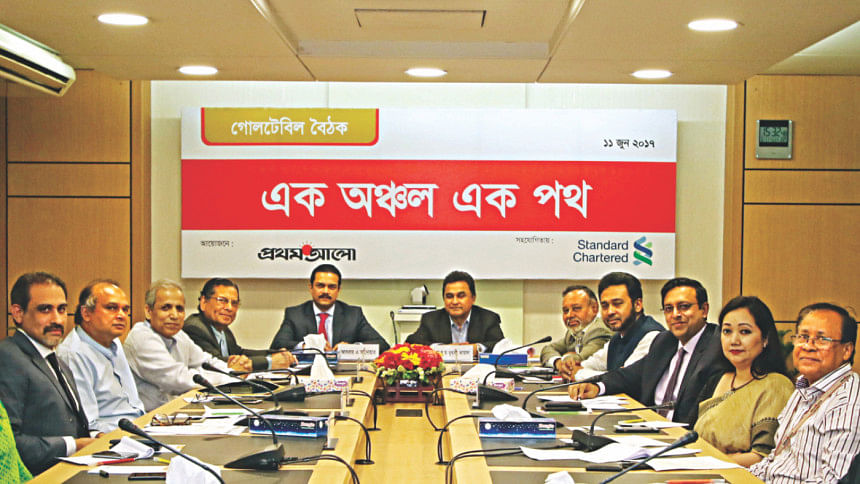One Belt, One Road a golden opportunity: analysts

Bangladesh should not have any confusion in joining the One Belt, One Road (OBOR) initiative to attract more foreign direct investment from China, mainly to improve its infrastructure, said a noted economist yesterday.
The country should align its policies to engage with China's 'belt and road' initiative, said Mustafizur Rahman, distinguished fellow of the Centre for Policy Dialogue, at a discussion on OBOR organised by the daily Prothom Alo at its office in Dhaka.
Bangladesh was initially in two minds about joining the annual meeting of the OBOR, which was held in Beijing last month, as India was not going to participate. Bangladesh eventually went to the meeting.
A total of 29 heads of states and representatives from 130 countries took part in the meeting, Rahman said.
OBOR is not only an initiative by China, it is an initiative of other countries as well.
“It is a super-continental initiative as it included both Asia and Europe,” Rahman said.
The OBOR involved 68 European and Asian countries, which account for 60 percent of the global population and 40 percent of the global gross domestic product.
“So, this initiative is very important for Bangladesh,” Rahman said, adding that an opportunity has been created for the country because of two rising global economies -- India and China.
The two giants account for $20 billion of Bangladesh's $80 billion overseas trade.
Of the $20 billion, Bangladesh imports goods worth more than $12 billion from China and more than $6 billion from India in a year. However, shipments to the two countries from Bangladesh are worth a little above $1.5 billion in a year: about $800 million to China and $700 million to India.
But Bangladesh has the opportunity to export more to the two countries as China's annual import value is $2,000 billion and India's $500 billion, he said.
The country can also immensely benefit from the Bangladesh India China and Myanmar (BCIM) initiative, according to Rahman.
Bangladesh needs to improve the supply capacity of goods and the logistics and increase the people-to-people contacts for gaining more benefits from the giant economies, he said.
He also suggested seamless transport connectivity and turning the roads into economic corridors to reduce the lead time.
“Tariff is no more a concern, but the lead time in international business is.”
The establishment of rail link between China and Europe will reduce the lead time substantially, and Bangladesh can also link the special economic zones and deep sea port with the OBOR initiative, Rahman added.
Planning Minister AHM Mustafa Kamal echoed with the opinions of Rahman.
“We do not see the OBOR politically,” he said, adding that Bangladesh has been developing four ports -- Chittagong, Mongla, Payra and Sonadia deep-sea port -- so that the country can be connected with the initiative.
India is also benefitting from Chinese investment, he said, while citing the examples of Chinese companies Lenovo, Xiaomi and Vivo that have made substantial investment in India.
Not only in India, China has also invested more than $40 billion in port development in Pakistan, Kamal added.
Chinese private sector investors are also getting ready to invest abroad along with the state-owned companies, said Abrar A Anwar, chief executive officer of Standard Chartered Bangladesh.
China's domestic consumption is on the rise due to its huge population and the shifting of its manufacturing base to high-end products, he said.
Bangladesh has the opportunity to supply shoes, toys and bags to China as there is a big ready market for the items there, he added.
Standard Chartered has already set up a separate desk in China for dealing with investors eager to invest in Bangladesh, he said.
China has already invested $1.1 trillion on the OBOR fund and Bangladesh has the opportunity to avail this fund to meet the demand for capital in infrastructure projects, Anwar added.
“The OBOR is a golden opportunity for Bangladesh,” said Abul Kasem Khan, president of the Dhaka Chamber of Commerce and Industry.
But Bangladesh needs to strengthen its capacity for attracting Chinese investment under the OBOR initiative.
If the country can invest between $18 billion and $20 billion in infrastructure development, it would be able to attract $300 billion to $320 billion of foreign direct investment in the next 17 to 18 years, he said.
Khan went on to thank the government for increasing the allocation for infrastructure development projects to 3.6 percent of GDP in fiscal 2017-18 from existing 2.8 percent.
“But this percentage should be more, like in other developing countries,” he said, while citing Vietnam as a case in point.
Vietnam spent 10 percent of its GDP on infrastructure over the past 10 years. In the last five years, Vietnam was able to attract $60 billion of FDI in contrast to Bangladesh's $3-4 billion.
He urged the government to quickly implement the special economic zones for starting production in the specialised areas.
The government should formulate a policy for investing in Myanmar as it has immense potential, said Shafiul Islam Mohiuddin, president of the Federation of Bangladesh Chambers of Commerce and Industry.
He suggested the government establish the deep-sea port at Sonadia as soon as possible as the capacity of the existing ports is not enough to handle the country's ever growing import and export.
Abdul Qayyum, associate editor of the Prothom Alo, moderated the discussion.

 For all latest news, follow The Daily Star's Google News channel.
For all latest news, follow The Daily Star's Google News channel. 



Comments